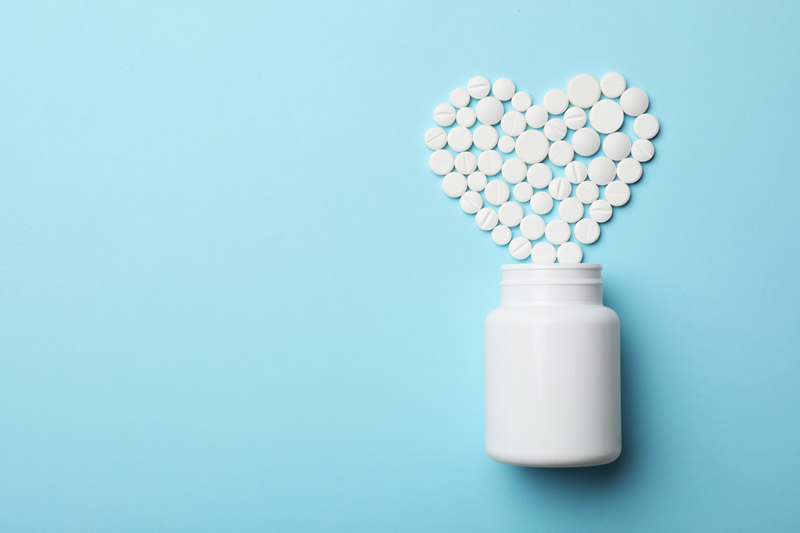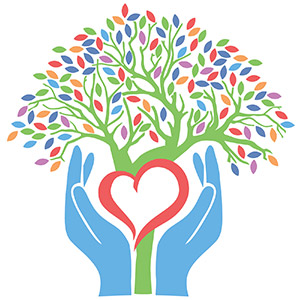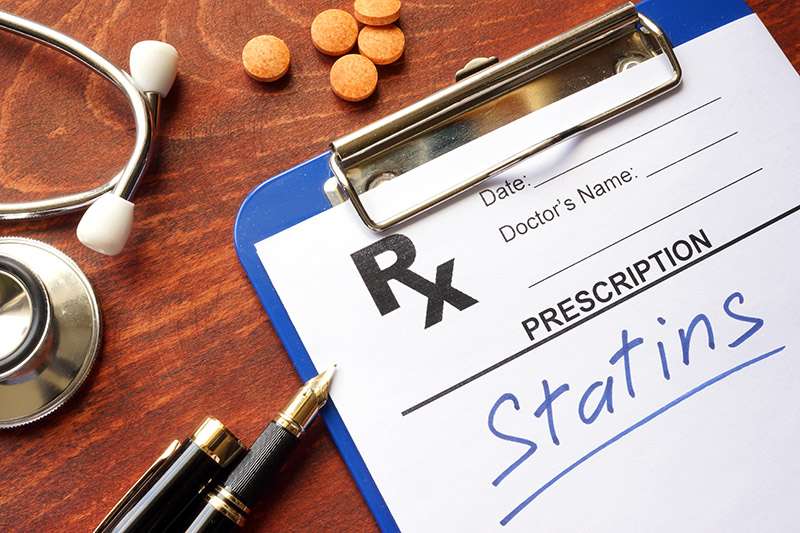Should I take a daily aspirin to help prevent a heart attack or stroke?
The media presents conflicting information regarding daily aspirin use, leaving patients confused about whether a daily aspirin for heart attack and stroke prevention would be beneficial, or whether it might do them more harm than good. Headlines have touted that a daily aspirin is “no longer recommended by doctors if you are healthy,” but the key word is healthy . . . which medical practitioners often define in different ways.
Research undeniably affirms that patients with known cardiovascular disease should take a daily anticoagulant (blood thinner). This is called secondary prevention, and in these patients, the benefits associated with reducing the rates of both heart attack and ischemic stroke outweigh the risk of a possible hemorrhage. (REF 1, 2) Some patients only need to take aspirin, but others may require prescription blood thinners. The struggle comes in defining risk for primary prevention (patients who have not yet had a cardiovascular event). Most medical providers follow the USPSTF guidelines for preventative medicine, but these guidelines only recommend using a risk calculator to assess a patient’s cardiovascular risk . . . and do not even offer recommendations for patients under 50 or over 70.
There are better ways to assess an individual’s cardiovascular (CV) risk than just adding up a few data points. Instead of playing a guessing game with probabilities, there are tests that can directly detect hidden plaque in asymptomatic patients, helping to accurately identify patients truly at increased risk of a heart attack or stroke (CIMT, CACS).
The crux of the issue comes down whether a patient has any plaque in their arteries, because if they do, then the benefits of taking a daily low-dose aspirin clearly outweigh the potential risks. If patients have plaque, then they have arterial disease, and should be classified as "secondary prevention."
What are the risks of daily aspirin therapy?
Of all the anti-platelet drugs available, aspirin is both the most effective and the least expensive drug . . . in addition to being relatively nontoxic. (REF 3) Data consistently proves that daily aspirin therapy lowers CV risk, but taking a daily anticoagulant can also increase the risk of a bleed. (REF 8, 9)
Though the majority of these bleeds are not life threatening, 3-5% of patients who take a daily low dose aspirin for cardiovascular protection end up with a gastrointestinal bleed. This is why proper patient selection and dose are so critical.
What benefits do I get from taking daily low-dose aspirin?

The majority of clinical trials have demonstrated that aspirin has a significant beneficial effect in reducing the risk of myocardial infarction and death. When summarizing five trials that included a total of over 55,000 patients, aspirin was associated with a 32% reduction in the incidence of first heart attacks - a substantially higher benefit than the risk of a bleed! (REF 4)
When summarizing eight trials that included over 25,000 patients, aspirin was associated with a 21% reduction in the incidence of all cancers (it was most beneficial in gastrointestinal cancers). (REF 5)
Lastly, low dose aspirin has been shown to prevent cognitive decline in women with high CV risk. (REF 6) This is most likely due to the prevention of micro-vascular thrombi (clots) that can land in different places in the body and brain, offered referred to as “micro-vascular dementia” or “the disease of aging.”
What is the best dose of aspirin to take?
Studies vary regarding the “best” dose of aspirin for CV prevention, but low to medium dose (80 mg/day to 160 mg/day) seems to be the preferred regimen. (REF 3) Ultimately, the right dose of aspirin for patients with plaque in their arteries is the lowest dose that is effective.
At Whole Heart Family Medicine, we start patients with known atherosclerosis (arterial plaque) on one coated 81mg aspirin a day (and have them take it with food). However, anywhere from 5% to 40% of the individuals taking aspirin for secondary prophylaxis against heart disease are non-responders. (REF 3) In a meta-analysis of over 1,800 patients from 12 prospective studies, the average prevalence of “resistance” was 27%. (REF 7) These non-responders would require a higher dose of aspirin, or a different anticoagulant, to attain effective blood thinning.
Watch this video from the Bale/Doneen Method
This five-minute video by Amy Doneen explains our medical stance on aspirin use, and its benefits for patients with known atherosclerosis.
REFERENCES
1 – Gorelick PB, Weisman SM. Risk of hemorrhagic stroke with aspirin use: an update. Stroke 2005; 36: 1801-7.
2 – Antithrombotic Trialists’ (ATT) Collaboration. Aspirin in the primary and secondary prevention of vascular disease: collaborative meta-analysis of individual participant data from randomized trials. Lancet 2009; 373: 1849-60.
3 - https://www.ncbi.nlm.nih.gov/pmc/articles/PMC2716223/#b25-ecc10017
4 – Eidelman, R., Hebert, PI, Weisman, S., et al. An update on aspirin in the primary prevention of CVD. Arch Intern Med. 2003; 16(17):2006-2010
5 – Rothwell, P., Fowkes, G., Belch, J., et al. Effect of daily aspirin on long term risk of death due to cancer: analysis of individual patient data from randomized trials. The Lancet (377); 4759, Jan 2011, p. 31-41.
6 – Kern, S., Skoog, I, et al. BMJ. Open Oct 8, 2012. Bmjopen-2012-001288
7 - Arch Intern Med 8/13-27/2007; 167:1593-1599.
8 - https://www.ncbi.nlm.nih.gov/pmc/articles/PMC6439678/
9 – Siller-Matula JM. Hemorrhagic complications associated with aspirin: An underestimated hazard in clinical practice. JAMA June 6, 2012; 301:2318-2320.




